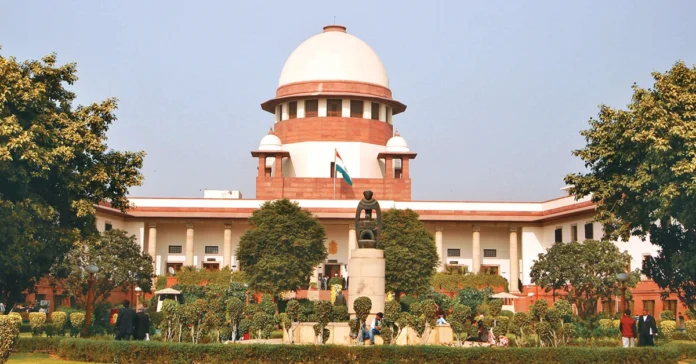In order to prevent the misuse of Section 498A IPC (cruelty offence) in matrimonial disputes, the Supreme Court has directed the States and Union Territories to establish Family Welfare Committees (FWCs) in each district of the country.
The Bench of Chief Justice of India BR Gavai and Justice AG Masih on Tuesday directed the appropriate authorities to implement the guidelines framed by the Allahabad High Court in its June 13, 2022 judgment.
In its 2022 verdict, the High Court issued a set of guidelines, while referring to the Apex Court ruling in Social Action Forum for Manav Adhikar vs Union of India 2018 (10) SCC 443.
The High Court said the objective was to curb the increasing tendency among litigants to implicate the husband and his entire family through broad and sweeping allegations.
As per the guidelines, police could neither arrest nor take any action against the named accused persons after lodging of FIR or complaints without completing the cooling period of two months from the lodging of the complaint/FIR.
During the cooling period, the matter would be immediately referred to FWC in each district.
Only those cases transferred to FWC in which Section 498-A IPC, along with no injury 307 and other Sections of IPC, in which the imprisonment was less than 10 years.
The High Court ordered establishment of at least one FWC in each district, depending on the geographical size and population of that particular district constituted under the District Legal Aid Services Authority, comprising at least three members.
The constitution and function of FWC should be reviewed periodically by either the District & Sessions judge or Principal judge, Family Court of the district, who shall be the Chairperson or Co-chairperson of that district at Legal Service Authority.
The guidelines said each FWC should consist of at least three members, including a public-spirited young man, who could be either a young mediator from the Mediation Centre of the district, a young advocate having practice up to five years, or a seniormost student of Vth year, Government Law College/State University/NLUs, having good academic track record.
The second member should be a well-acclaimed and recognised social worker of that particular district having clean antecedents.
The third member should either be a retired judicial officer residing in or nearby the district, who can devote time for the object of proceeding; or educated wives of senior judicial or administrative officers of the district.
The FWC members shall never be called as a witness.
Every complaint or application under Section 498A IPC and other allied sections mentioned above, be immediately referred to Family Welfare Committee by the concerned Magistrate. After receiving the said complaint or FIR, the Committee shall summon the contesting parties along with their four senior elderly persons to have personal interaction and would try to settle down the issue/misgivings between them within a period of two months from its lodging.
The contesting parties were obliged to appear before the Committee with their four elderly persons (maximum) to have a serious deliberation between them with the aid of members of the Committee.
The Committee after having proper deliberations, would prepare a vivid report and would refer to the concerned Magistrate/police authorities to whom such complaints are being lodged after expiry of two months by inserting all factual aspects and their opinion in the matter.
Continue deliberation before the Committee, the police officers shall themselves to avoid any arrest or any coercive action pursuant to the applications or complaint against the named accused persons.
However, the Investigating Officer shall continue to have a peripheral investigation into the matter namely preparing a medical report, injury report, the statements of witnesses.
The said report given by the Committee shall be under the consideration of I.O. or the Magistrate on its own merit and thereafter suitable action should be taken by them as per the provision of Code of Criminal Procedure after expiry of the “Cooling-Period” of two months.
Legal Services Aid Committee shall impart such basic training as may be considered necessary to the members of Family Welfare Committee from time to time(not more than one (26) week).
Since this was a noble work to cure abrasions in the society where tempos of the contesting parties were very high that they would mellow down the heat between them and try to resolve the misgivings and misunderstandings between them. Since, this is a job for public at large, social work, they are acting on a pro bono basis or basic minimum honorarium as fixed by the District & Sessions Judge of every district.
The investigation of such FIRs or complaint containing Section 498A IPC and other allied sections as mentioned above, shall be investigated by dynamic Investigating Officers whose integrity is certified after specialized training not less than one week to handle and investigate such matrimonal cases with utmost sincerity and transparancy.
When settlement was reached between the parties, it would be open for the District & Sessions Judge and other senior judicial officers nominated by him in the district to dispose of the proceedings including closing of the criminal case.
In 2017, the Apex Court had laid down similar guidelines in Rajesh Sharma and others vs State of UP and another case. In 2018, however, the top court of the country withdrew these directions in Social Action Forum on the grounds that the Court could not fill in the legislative gaps.
With the latest verdict, the guidelines in the Rajesh Sharma case have been effectively restored to a great extent.


